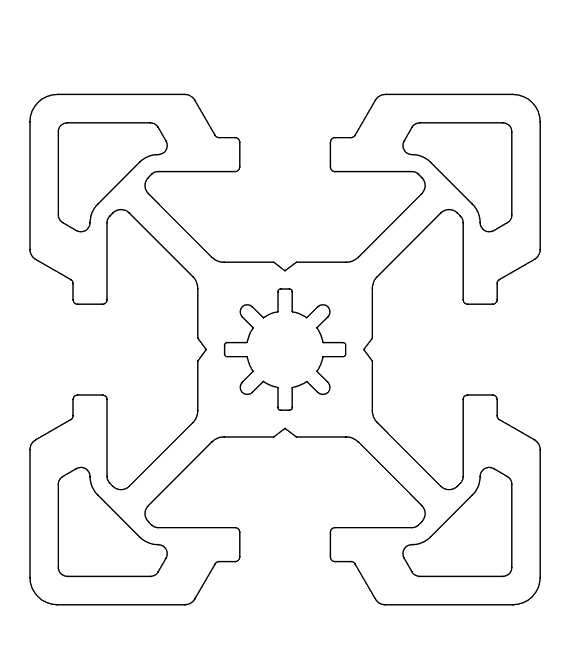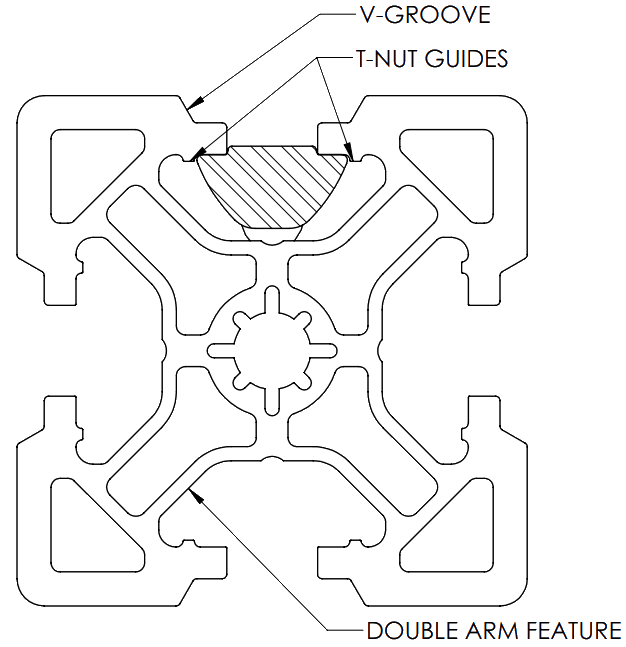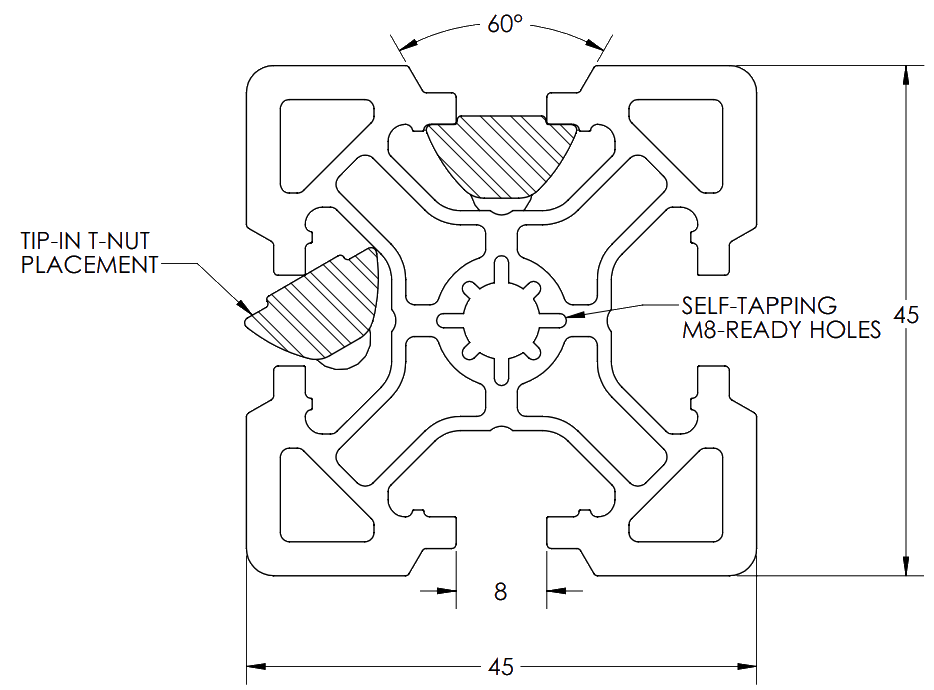|
Vention’s new T-slot aluminum extrusions are both lighter and stronger than the originals. Featuring a double-arm profile and high-performance alloy, V2 extrusions have improbed 3-point bend strength, more torsion resistance, and lower weight, all with the same easy assembly and retro-compatibility you’ve come to expect from Vention.
What's new: significant improvements in performance
The core of the V2 family of T-slot aluminum extrusions is the new double-arm feature. This design feature allowed for redistribution of material from the profile’s center towards the outside. There, it has the greatest impact on strength and stiffness, while reducing the material overall. This material saving cuts weight by 6.9%.
Also returning is our patented V-groove feature for anchoring extrusions to one another. The V-shaped groove eliminates angular error when fitting extrusions together, allowing for solid and precise anchoring. Additionally, each assembly node can carry up to 25% more payload than nodes without V-shaped grooves.
|
|
Vention’s V1 extrusion. | Vention’s V2 extrusion. |
Easier assembly
Speed up your assembly by spending less time positioning t-nuts. The V2 design features two guiding edges that run the length of the extrusion. These fences force the t-nut into the correct position, so t-nuts will always be correctly positioned when a plate is bolted to them.
Plus, just like with V1 extrusions, t-nuts can be inserted sideways. This lets you place t-nuts at any point along the extrusion length, even when the extrusion ends are blocked.
Full retro-compatibility
V2 extrusions retain all the functionality of the first generation, and are compatible with V1 extrusions too. Using the same M8 x 1.25 mm screw size as before, while still allowing assembly of every size of V2 extrusion machine frames with just one tool: a single 5mm Allen key.
|
Improvements over V1
Vention’s first generation of aluminum extrusion profiles had an industry-leading area moment of inertia, which enabled highly rigid structures. By further optimizing this design, the second generation of extrusions now has 50% higher torsion and 26% higher bending rigidity.
Test | Description | Parameter | Improvement over V1 |
1. Torsion | 50 Nm load applied to 630mm sample | Angular Displacement (deg) | 50.7% |
2. Three Point Bend | 1080 N load; 610 mm between centers. | Deformation (mm) | 26.0% |
3. T-nut Pullout | Force required to pull a t-nut out of the extrusion. | Force (kN) | Same as V1 (16.7 kN) |
4. Anodizing | Anodized coating hardness. | Mohs Hardness | Same as V1 |
5. Friction | Force (per bolt) required to slide a fastened assembly plate. | Force (kN) | Same as V1 (2.1 kN) |
6. Weight | Weight of a 630mm sample. | Weight (N) | 6.9% decrease |
7 - Arm deflection | Deflection of the double-arm feature at 500 N. | Deflection (mm) | 17.3% |
Table 1: generational improvement in vention extrusions.
Also new with these profiles is a switch to 6005-T5 aluminum alloy. Compared to 6063-T5, this alloy has a 72% higher yield strength, and a Brinell hardness increase from 65 to 90. This improvement in material properties greatly improves bending and buckling strength (see our design guide).
V2 extrusions vs. other comparable products
Engineers must be concerned with both the strength (ideally higher) and the weight (ideally lower) of their building materials. It is thus critical to consider the ratio of strength to weight, with higher values indicating better performance.
Compared to alternatives, Vention’s V2 extrusion has a much higher specific area moment of inertia, which is a ratio of strength to weight. This means V2 extrusions will allow for lighter and stronger structures than other the profiles.
Vention V2 | Alternative A | Alternative B | Alternative C | Alternative D | |
|
|
|
|
| |
Profile Dimensions (mm) | 45 x 45 | 45 x 45 | 45 x 45 | 45 x 45 | 45 x 45 |
Material (aluminum) | 6005-T5 | 6560-T6 | 6105-T5 | 6063-T5 | 6063-T5 |
Profile area (mm2) | 761 | 563 | 757 | 571 | 737 |
Area moment of inertia (mm4) | 162,325 | 107,780 | 139,310 | 109,635 | 141,720 |
Torsional constant (mm4) | 31,851 | 19,394 | 31,042 | 19,836 | 39,719 |
Weight per meter (kg) | 2.06 | 1.53 | 2.05 | 1.55 | 2.03 |
(Area moment of inertia) / (Surface Area)(mm2) | 213 | 191 | 184 | 192 | 192 |
Max deflection (500mm cantilever) at 1500 N force (mm) | 5.58 | 8.28 | 6.50 | 8.25 | 6.30 |
Stress (500mm cantilever) at 1500 N force (MPa) | 103.96 | 156.57 | 121.05 | 153.48 | 117.11 |
Torsional displacement (1m length) at 50 Nm torque (degrees) | 3.46 | 5.68 | 3.55 | 5.55 | 2.77 |
Table 2: profile specifications.
V2 extrusion profile sizes
In accordance with Vention’s “t-shirt” sizing philosophy—small, medium and large—V2 extrusions come in three sizes, with outer profile dimensions of 45 x 45 mm, 45 x 90 mm, and 90 x 90 mm.
Larger profiles have more mounting locations and greater strength. By having these different sizes, the user can determine where to add strength by simply stepping up to the next size of extrusion. To facilitate this choice, refer to the design guide.
As for length, V2 extrusions are available in 45 mm increments—just like the first generation—with the addition of 13 new lengths. Check out our part s library for a complete list of extrusion lengths.
Conclusion
Combining both functional and mechanical improvements, Vention’s second generation of aluminum T-slot extrusions will make assemblies stronger, lighter-weight, and easier to install. In February 2021, V2 extrusions will start to ship on a rolling basis alongside our original V1 extrusions, with a full transition expected by June 2021.




.png)
.png)
.png)
.png)
.png)
.png)
.png)
.png)